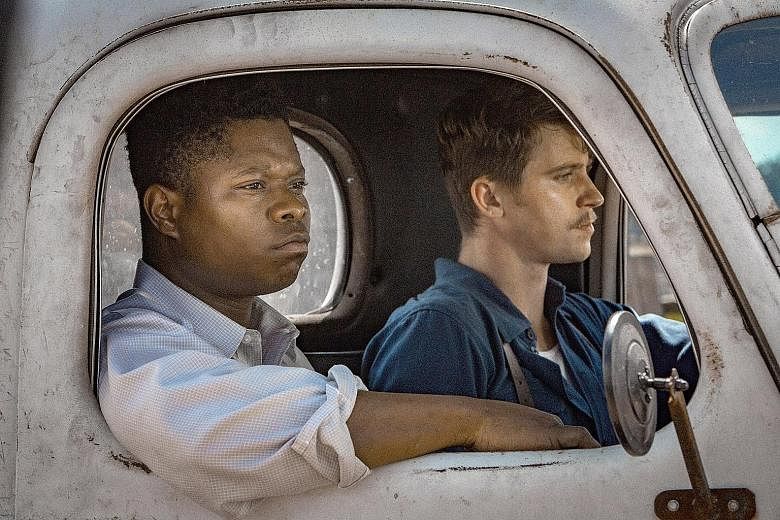NEW YORK • At the Middleburg Film Festival in Virginia last month, director Dee Rees had tears in her eyes. Her movie Mudbound had just brought the crowd to their feet.
Even though she had been on tour for several weeks with the film - a sprawling historical drama about two families, one African-American, one white, working a hardscrabble patch of land in the American South - she was clearly overcome.
The film grapples with difficult material, including violence, racism and poverty, that feels dispiritingly timely. But the Middleburg viewers embraced it.
"This film was always about inheritance as a country and who we are," said Rees during a question-and-answer session after the screening.
"If you want to get beyond the surface reading of race, just think about your inheritance. Not physically, but ideas. What has been unconsciously passed on to you and what are you unconsciously passing down?"
Mudbound went on to earn Middleburg's Audience Award, one of several plaudits that is putting it squarely in play in the run-up to Oscar season. Two weekends ago, it nabbed a Hollywood Film Award.
This month, New York's Gotham Awards will bestow it a special jury prize for ensemble performance.
When it comes to classical form and meaningful content, no film this season better embodies the term "Oscar movie" than Mudbound, which opens on Friday in theatres and on Netflix.
The film, which takes place in the wake of World War II, stars Jason Clarke and Carey Mulligan as Henry and Laura McAllan, who move from Memphis to the Mississippi Delta to work on a farm. Their neighbours are Hap and Florence Jackson (Rob Morgan and Mary J. Blige), whose families have worked the same land for generations as sharecroppers.
Rees, 40, brought her personal history to bear on the project. Whereas Hillary Jordan's 2008 novel of the same name and Virgil Williams' original screenplay focused mostly on the McAllan family's dreams and defeats, she conjured memories of her grandmother, whose parents worked the cotton fields on a farm in Louisiana.
"My grandmother's thing was, 'I'm not going to pick cotton, I'm not going to chop it, I'm not going to clean anybody's house'," Rees said.
"So that's why the little girl in the film wants to be a stenographer. It was important that the Jackson family have dreams, they have ideas."
Rees' journey reflects that same continuum of aspiration. She grew up in Nashville as "a very closely watched kid" who liked to write poems and short stories, but wound up going to business school and pursuing a career in marketing.
In 2005, she quit corporate life to attend film school at New York University. After her studies, she made a 30-minute segment of a feature script she had written called Pariah, the portrait of a teenage girl coming out in Brooklyn.
With grants and credit cards, she managed to make the feature version, which premiered as the opening night film at Sundance in 2011. It became one of the most memorable debuts in recent Sundance history.
She was hired to write a few projects. Nothing came to fruition until she made Bessie, an HBO film about blues singer Bessie Smith.
When Cassian Elwes read Williams' Mudbound script and signed on to produce it, he immediately thought of Rees as a possible director. But Mudbound did not enjoy a high-dollar bidding war when it premiered at Sundance in January.
Distributors were afraid of confronting race and class during the Trump era. Netflix wound up buying the film for US$12.5 million (S$17 million) and will play it in at least 10 theatres while making it available for streaming. It has enlisted top Oscar consultants in a campaign that will surely draw attention to Blige's revelatory supporting performance as well as Rees and other members of her cast.
As the praise mounts for a movie that has clearly found its moment, Elwes said "every single person on the other side of the (Sundance negotiating) fence is kicking themselves because it's one of the most important movies of the year".
To admirers who insist Mudbound should be seen in theatres to be appreciated, Rees countered that accessibility outweighs formal purity. "You can read Tolstoy on a Kindle, you can read Tolstoy in a paperback, you can read it in a hardback," she said. "It's not going to change the fact that it's literature.
"Mudbound on your TV doesn't make it not cinema. This is cinema, full stop."
WASHINGTON POST

